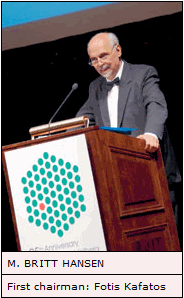 European Research Council Moves a Small Step Closer to Parturition.
(December 8, 2005)
European Research Council Moves a Small Step Closer to Parturition.
(December 8, 2005)
|
News & Views item - December 2005 |
![]()
 European Research Council Moves a Small Step Closer to Parturition.
(December 8, 2005)
European Research Council Moves a Small Step Closer to Parturition.
(December 8, 2005)
In January 2002 TFW reported, "The concept of a European Research Area (ERA) has been bandied about in various popular and scientific publications for several years... there is a strong move toward consolidation for the EU to be able to compete collectively on a par with the big players so that its people can maintain/improve their living standards. To this end research including basic research as well as development are of fundamental importance. United they prosper, divided they will wane."
Today Nature reports that "The European Research Council (ERC), to be launched in 2007, will be the first Europe-wide granting agency for basic research. On 5 December, its Scientific Council announced the election of molecular biologist Fotis Kafatos as chairman."
Summing up an interview with Nature's Alison Abbott Kafatos says
The Scientific Council is the supreme body [of the ERC], and the agency will operate under our guidance. We will be assisted by a secretary-general who will have the experience to create and supervise an efficient, flexible and responsive structure for our calls for proposals and the peer-review system.
The ERC will cover all fields of scholarship. One of our key tasks is to work out how to structure calls in a way that does not compromise this basic tenet. At the moment, no option is excluded. We will also think about a two-stage application procedure to relieve oversubscription.
[So far as just how the ERC will utilise the peer review system] is something that we have to work out in detail. Certainly, it will take into account the international best practice.
It would not be worth establishing the ERC if it were poorly endowed — the funding has to be sufficient for it to work properly and make a difference. Personally, I think the absolute minimum would be €1 billion per year.
In about twelve-month's time it should be clear just how much of a commitment the twenty-five member nations of the European Union will have to resourcing the ERC but what seemed like a distant vision if not mirage has, even if slowly, moved much closer to reality. And if it does, Australia will be surrounded even more by powerful competitors for top-flight research personnel.